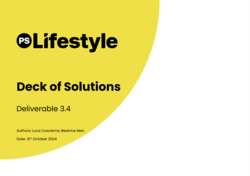Deck of Solutions Deliverable 3.4
The European Union Horizon-2020 project ‘Co-creating a Positive and Sustainable Lifestyle tool with and for European Residents – PSLifestyle1 aims at enhancing the uptake of low-carbon lifestyles in line with the 1.5-degree target of the Paris Agreement. To this end, the project developed the Lifestyle Test, a free web app for European citizens to calculate their carbon footprint and be informed of sustainable lifestyle solutions they can implement to reduce their climate impact.
Since the launch of the Lifestyle Test in 2023, the project team collected people’s consumption and climate impact data for further use and exploitation in research, as the basis of effective policies, civil society initiatives, sustainable business opportunities or research ideas to fill knowledge and data gaps.
The project team has been engaging with key stakeholders from society through the implementation of workshops in the eight project case countries, Estonia, Finland, Germany, Greece, Italy, Portugal, Slovenia, and Turkey, to disseminate project results and co-design solutions for a mainstream uptake of sustainable lifestyle options.
This document presents a collection of sheets, part of which have been used to facilitate stakeholder workshops, that contain aggregated results from the test users, with the aim of showcasing the data capability of the test and presenting a snapshot of what we can learn from the data product in terms of solutions for implementing sustainable lifestyles.
The Deck of Solutions can be utilised to:
- Facilitate stakeholder workshops. Organize workshops using the Deck as a discussion tool. The data can serve as a basis for brainstorming sessions, helping stakeholders identify local challenges and co-create solutions. This collaborative approach fosters a sense of ownership and commitment to sustainable practices.
- Inform Policy and Decision-Making. Policymakers can leverage the Deck's data to inform the development of targeted policies that address specific environmental issues prevalent in their regions. For example, if the data indicates high carbon emissions from transportation in a particular area, policies can be designed to promote electric vehicles or improve public transportation infrastructure.
How to best use the Deck of Solutions:
- Tailor the presentation to your audience. Each country section in the DoS provides localized data, reflecting the unique consumption patterns and environmental impacts of its residents. Utilize these country-specific insights to make your presentations more relatable and impactful. For instance:
- Germany: Highlight the data on transportation choices and energy consumption to discuss potential areas for improvement in urban mobility and energy efficiency.
- Italy: Focus on dietary habits and waste management practices to promote sustainable food consumption and waste reduction initiatives.
- Showcase data-driven solutions. The DoS not only presents data but also suggests actionable solutions tailored to each country's context. Use these recommendations to propose practical steps that stakeholders can implement, such as:
- Encouraging the adoption of energy-efficient appliances.
- Promoting sustainable transportation options like cycling or public transit.
- Advocating for reduced food waste through community programs.
- Monitor Progress and Adjust Strategies. Regularly review the data presented in the Deck to assess the effectiveness of implemented strategies. Tracking changes over time allows stakeholders to adjust their approaches as needed, ensuring continuous improvement towards sustainability goals.
By integrating the insights and recommendations from the Deck of Solutions into your communications and strategies, you can effectively engage stakeholders and drive meaningful action towards sustainable lifestyles.
Publication Date: 13 Dec 2024
This project has received funding from the European Union’s Horizon 2020 research and innovation programme under grant agreement No 101037342.
